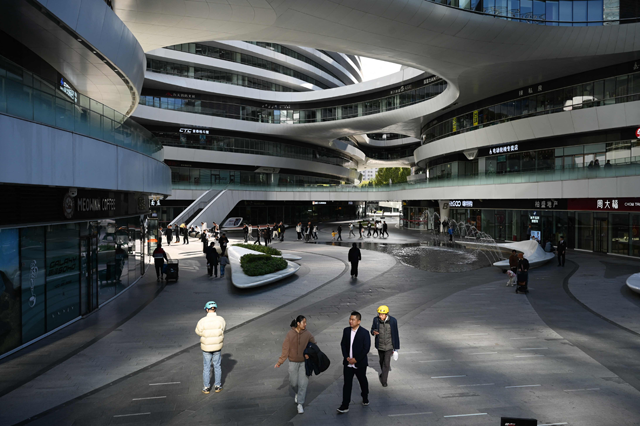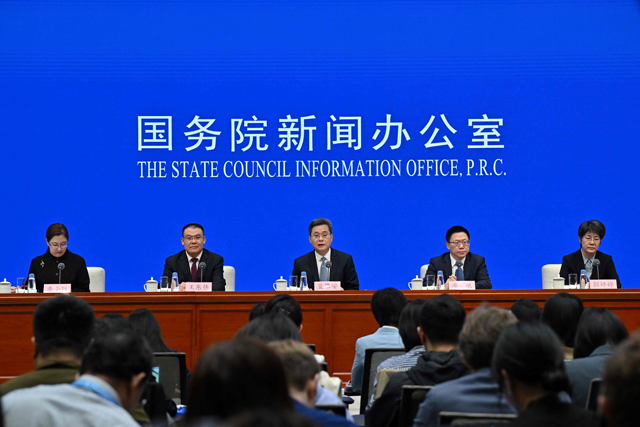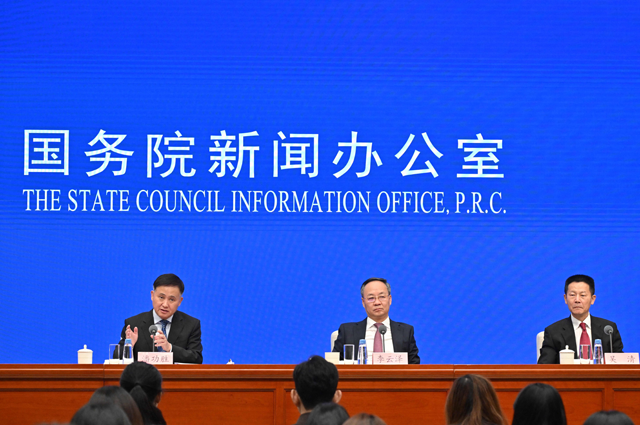You are here
China to hash out stimulus plan with US elections in its sights
By AFP - Nov 04,2024 - Last updated at Nov 04,2024

People walk in a quiet shopping mall in Beijing on November 3, 2024. (AFP file photo)
BEIJING — China's top lawmakers gather Monday to hash out a major stimulus package that analysts say could grow even bigger if former US president Donald Trump wins the White House this week.
Beijing has in recent months heeded calls to step up support for the economy after years of inaction, announcing a raft of measures including rate cuts and the easing of some home buying restrictions.
But they have refrained from unveiling a figure for the long-awaited stimulus, disappointing investors after a market rally fizzled when officials repeatedly failed to commit to a top line.
Analysts now hope this number could emerge from this week's meeting of the Standing Committee of National People's Congress, the top body of China's rubber stamp parliament and headed by number three official Zhao Leji.
The standing committee reviews and approves all legislation, including allocating funds out of China's budget.
"We are expecting more details on the proposals to be passed," said Heron Lim of Moody's Analytics, including "how this extra funding would be allocated to address the near-term economic issues".
Nomura economists expect lawmakers this week to approve around a trillion yuan ($140 billion) in extra budget — mostly for indebted local governments.
Analysts also expect Beijing to approve a one-off one trillion yuan for banks, aimed at writing off non-performing loans over the past four years.
"A lot of money will go to cover losses," added Natixis' Alicia Garcia Herrero.
"It's not really a growth push."
Concrete measures are expected to be announced when the meeting wraps up on Friday — in time for Beijing to take stock of results of presidential elections in the United States.
"We believe the US election results will have some impact on the size of Beijing's stimulus package," said Ting Lu, Nomura's Chief China Economist, in a research note.
Both candidates in the race have pledged to get tougher on Beijing, with Trump promising tariffs of 60 per cent on all Chinese goods coming into the country.
'Major challenges'
Nomura economists expect Beijing to adjust the size of its stimulus depending on the outcome.
"In our view, the size of China's fiscal stimulus package would be around 10 to 20 per cent bigger under a Trump win than under the scenario of a (Kamala) Harris win," Lu wrote.
But he said that "the major challenges for Beijing emanate from within rather than outside".
China is battling sluggish domestic consumption, a persistent crisis in the property sector and soaring government debt — all of which threaten Beijing's official growth target of five percent for this year.
The property sector was long a key driver of growth, but is now mired in a sea of debt.
Average prices of new residential property ticked up slightly last month, according to a survey of 100 cities by independent researcher China Index Academy.
But China's cities and provinces are still on the hook for a trove of unfinished and unsold housing units, and repurchasing them could cost Beijing up to 3.3 trillion yuan, according to Natixis estimates.
Prolonged housing woes continue to lead to weak consumer consumption, according to Lim of Moody's Analytics.
"The average Chinese consumer with existing mortgages does not feel their wealth is increasing," he said.
The issue of how local governments manage debt is also set to come under scrutiny at the NPC meeting this week.
Authorities at and above the county level will be required to report their debt situation to the NPC each year, Huang Haihua, spokesman for the NPC standing committee's legislative affairs commission, said at a briefing Friday.
But China's economic woes run deeper than local mismanagement and empty homes.
"The overall economy is losing productivity out of basically misallocated savings," said Garcia Herrero, referring to issues within China's industrial policy spending, including extensive subsidies.
"They need to really change all of that," she said.
Related Articles
BEIJING — China said Saturday it would issue special bonds to help its sputtering economy, signalling a spending spree to bolster banks, sho
BEIJING — China unveiled some of its boldest measures in years on Tuesday aimed at boosting its struggling economy as leaders grapple with a
BEIJING — Huge industrial overcapacity in China will drag on both the country's and the region's growth this year, the Asian Development Ban















